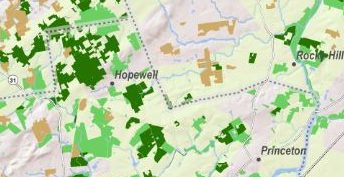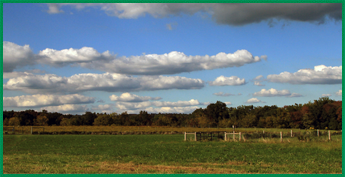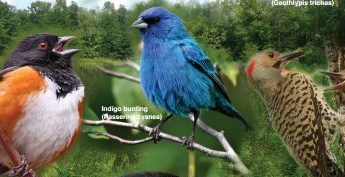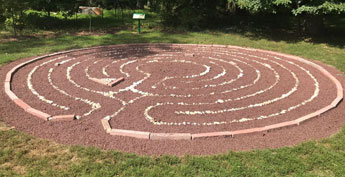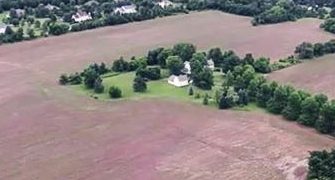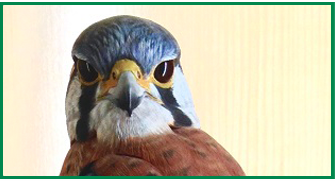 Princeton, N.J.— The Scott and Hella McVay Poetry Trail begins behind D&R Greenway Land Trust’s Johnson Education Center, winding up through an allee of sycamore and chestnut trees. Walk out past poems of Emily Dickenson, Rumi, Walt Whitman and others, up a hill blooming with aster, thistle and milkweed, to a place where the birds and insects sing a salute to the season. There are benches from which to contemplate Mary Oliver’s question: “Who made the world?” The ground is fertile with inspiration.
Princeton, N.J.— The Scott and Hella McVay Poetry Trail begins behind D&R Greenway Land Trust’s Johnson Education Center, winding up through an allee of sycamore and chestnut trees. Walk out past poems of Emily Dickenson, Rumi, Walt Whitman and others, up a hill blooming with aster, thistle and milkweed, to a place where the birds and insects sing a salute to the season. There are benches from which to contemplate Mary Oliver’s question: “Who made the world?” The ground is fertile with inspiration.
A new addition to the Scott and Hella McVay Poetry, “Garden,” by Pulitzer Prize-winning poet C.K. Williams (1936-2015), has been dedicated. The poem, published in Williams’ book “Vigil” in 1997, was written from le Parc de Bagatelle, in Neuilly, France, but the place “whose serenity lifts and enfolds me, as a swirl of breeze lifts the leaves and enfolds them” could easily describe Greenway Meadows Park.
Williams, a Princeton professor emeritus, and his French-born wife, Catherine Mauger, divided their time between Hopewell and Normandy, France. While in New Jersey, Williams and Mauger frequently visited Greenway Meadows and the Poetry Trail with their dog, Bwindi.
“Garden” was selected for the trail by Mauger and her son, Jed. “It was a poem I loved, it was the right length and about the right thing,” says Mauger. “He wrote many poems about nature, about storms and trees, but this one has such a peace in it. It’s a lot about him and all of us.”
“I was working in my office at the Johnson Education Center when I was told that I had a visitor, Catherine Mauger. The tears in her eyes told me how important the Poetry Trail was to her late husband,” says Linda Mead, D&R Greenway President & CEO. “Together with Bwindi, we walked to the top of the hill while we talked about C.K. and their life together. We chose the location for this very first addition to the Scott and Hella Poetry Trail because of its sweeping view of the lower fields, essentially a natural garden.”
“We love this park, it is one of the most beautiful parks around Princeton,” says Mauger. “C.K. loved trees, and the way they are planted here. A place like this was so important to him. It is a habitat for thousands of creatures.” She looks up as a falcon circles overhead. “We are so grateful to D&R Greenway for protecting the trees from being destroyed and houses built in their place.” Bwindi barks, as if in agreement.
“I come in every season,” continues Mauger, a designer of nature-themed jewelry—her ring has turtles and she wears a bracelet of silver seashells. When her three grandsons were younger, Mauger and Williams would bring them in winter to sled.
Williams served on the Princeton University faculty from 1995 to 2013, where he taught creative writing, introductory and advanced poetry, dramatic adaptation and literary translation. He received the Pulitzer Prize in 2000 for his book “Repair,” also a finalist for the National Book Award. “The Singing” won the National Book Award for 2003; and “Flesh and Blood” received the National Book Critics Circle Award in 1987. Other books of poetry include “Wait,” “Collected Poems,” “Writers Writing Dying,” “All at Once” and “Selected Later Poems.” A book of essays, “In Time: Poems, Poets, and the Rest,” was published in 2012. “Falling Ill,” completed 10 days before his death, is to be published in 2017.
“It has more than 50 poems, all the same shape and same number of lines, and it is an amazing farewell present,” says Mauger, who was frequently Williams’ muse.
Born in Newark and raised in South Orange and greater Philadelphia, Williams was babysat by Jerry Lewis. At 6-feet-5-inches, Williams was recruited to play basketball at Bucknell but transferred to the University of Pennsylvania. Beginning in the 1960s his work garnered attention for its opposition to the Vietnam War and its reflections on the Civil Rights movement. Among the other big questions he addresses are love, memory, social disorder, the natural world, the Holocaust, American race relations and climate change. In his six-decade career, Williams also published translations of Sophocles’ “Women of Trachis,” Euripides’ “Bacchae” and poems of Francis Ponge, among others. He wrote a memoir and two children’s books.
Williams’ last public reading was at Drew University in June 2015. His work was often compared to Whitman’s.
“We knew and admired Charlie as a poet, teacher and mentor to young poets,” says Scott McVay. “We count on poets to address the great issues in fresh ways, and Charlie did so. Hella and I are thrilled to have ‘Garden’ among the 48 other poems here in Greenway Meadows.”
Established in 2010, the Scott and Hella McVay Poetry Trail loops a meandering mile through a native plant meadow on D&R Greenway’s Conservation Campus. Forty-nine poems feature the work of poets from 14 countries and cultures. The common thread is the poet’s close read of some aspect of the natural world. The Scott and Hella McVay Poetry Trail speaks to the symbiotic relationship between art and nature.

